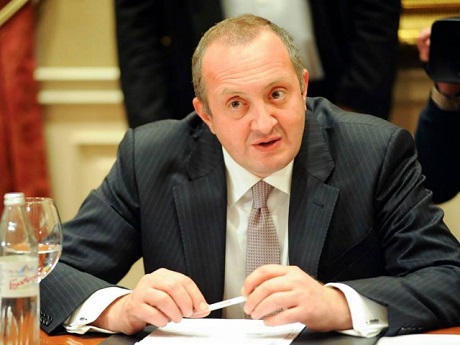What’s next after President’s veto?

Today President Giorgi Margvelashvili has for the second time vetoed a bill on surveillance that allows the Ministry of Internal Affairs (MIA) to retain ‘key’ access to surveillance. So what happens next?
The President has 10 days to send his proposal to Parliament. However, the President’s administration claims they will not use the full term and send the remarks shortly. Once this happens, Members of Parliament (MPs) will vote on his version at Parliament’s next plenary session.
For adapting the President’s remarks majority of presenting MPs should vote in favor of it, there should not be less than 50 MPs in Parliament while the voting process. If it does not gain enough votes, MPs will again vote on the Beselia-Popkhadze-Sesiashvili draft bill. And if the latter bill gains 76 votes, it will be approved.
At this stage, the Beselia-Popkhadze-Sesiashvili draft will again be sent to President Margvelashvili. If he fails to sign the document, Parliament Speaker David Usupashvili will sign it.
Majority assessments
Two of the people behind the Parliament-approved draft bill claimed the President’s proposal was "obscure”. MPs Beselia and Saganelidze stressed that the President’s Administration was drafting its proposal only after he released his statement about the veto.
"We have no problem overriding his veto. The majority has enough votes to do this,” Beselia said.
Saganelidze appealed to the President to present his proposal to Parliament as soon as possible.
Meanwhile coalition member party Republicans, who refrained from voting on the Beselia-Popkhadze-Sesiashvili draft bill, said it had not made a decision yet but were against the MIA being involved in the surveillance process.
"We do not have aspirations to override the veto [and] we will make a decision when the President presents his initiative,” Republican MP Davit Berdzenishvili said.
Opposition dislikes the President’s offer
Opposition political party United National Movement (UNM) and Free Democrats do not like the initiative pushed forward by President Margvelashvili. The parties stressed they did not support allowing the MIA to have any access to surveillance.
"Free Democrats did not take part in the voting process of the Beselia-Popkhadze-Sesiashvili draft. We are not going to take the part in discussions and voting of the President’s alternative version as it reveals the MIA as a [participant] in the surveillance process,” said Irakli Chikovani of Free Democrats.
NGOs welcome the President’s veto
Non-governmental organisations (NGOs) welcomed the President’s veto and admitted the initiative he voiced was better than the Beselia-Popkhadze-Sesiashvili draft.
Head of the International Society for Fair Elections and Democracy (ISFED) Nino Lomjaria said the President’s offer did not grant the MIA direct access to surveillance.
"It is a one-key system when the court gives permission and technical access to the MIA to carry out surveillance,” she said.
Fellow NGO representative Vakhushti Menabde confirmed if the President’s proposal was overridden and he again refrained from signing the Beselia-Popkhadze-Sesiahsvili draft, the latter would go to Parliament again for approval. If this happened Georgia’s Parliament Speaker, who earlier stated he disliked the MPs draft, will be obliged to sign it.
"This is stated in the Constitution. But if he doesn’t [sign it], there is a theoretical chance a Vice Speaker will fulfil the obligation. If no figurehead signs the draft it will not become law,” said Menabde.
 Tweet
Tweet  Share
Share